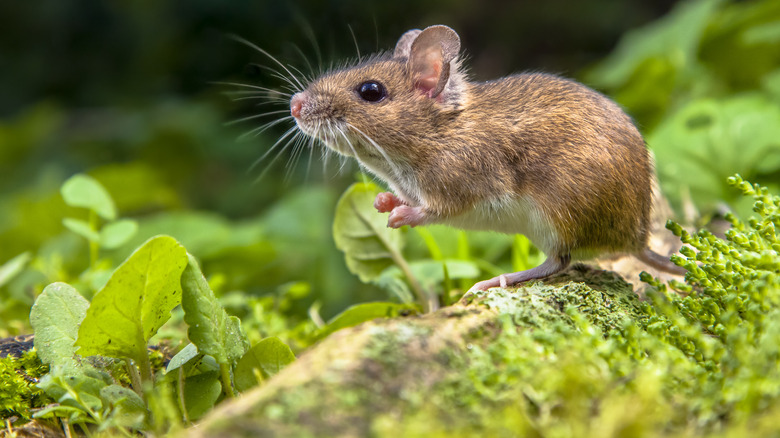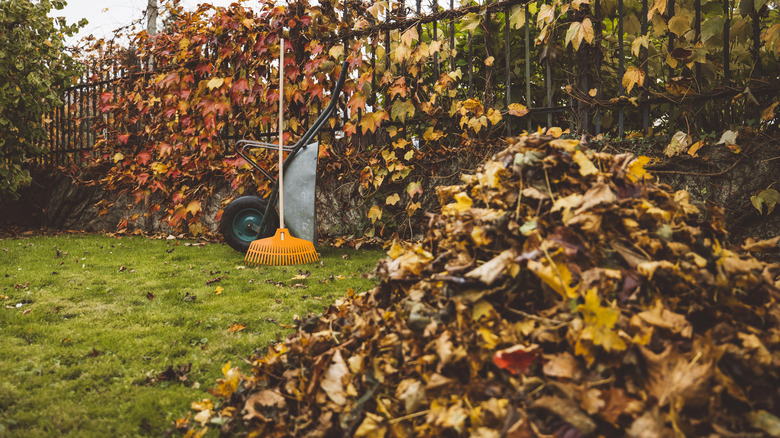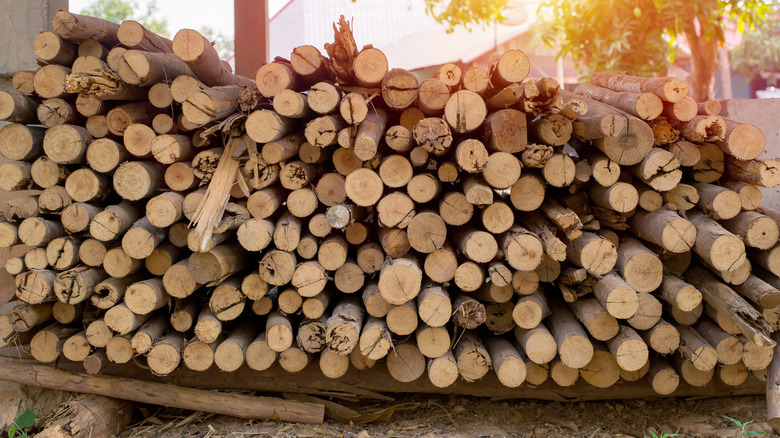The Lawn Care Mistake That's Attracting Mice To Your Yard
No one wants to have their backyard overrun by mice. Not only will it make relaxing on your patio a whole lot less tranquil, but it's also filled with health risks. According to the CDC, their droppings and urine can spread hantaviruses, which can cause fever, chills, intense muscle aches, and vomiting, among other symptoms. And while it might be unsettling to see mice scurrying across your lawn, it becomes an even bigger issue when they eventually come into your house. This becomes a distinct possibility if you see them in the fall or when the weather starts to cool. That's because these small pests will soon try to find warmth inside your garage or home, compounding your problem. To avoid this, you need to make your backyard less attractive to mice. However, there is one lawn care mistake you might be making that is inviting them to set up shop: Leaving debris behind that can double as hiding spots.
This doesn't mean you're leaving behind piles of trash in your backyard. Instead, this means you might have heaps of organic matter, like piles of leaves, stacks of wood, or mounds of compost, sitting innocently in a corner. While this might seem like normal yard stuff to the untrained eye, a mouse can see it as a cozy hiding spot and their new home. Here's why.
Why you should remove debris from your yard
If you have a pesky rodent problem in your backyard, it's most likely because there is either a food source attracting them or a safe habitat they feel comfortable moving into. Remove the latter issue by ensuring your backyard doesn't have any convenient nooks for mice to hide in. That means staying on top of yard debris. For example, having heaps of leaf piles can act as a "welcome" sign to these furry critters because mice are attracted to quiet, dim nooks where predators are less likely to find them. Leaves are also a great nesting material, so they will be beckoned to burrow in. Some mice also eat insects, so those forgotten leaf piles can also double as a convenient place to buffet.
Leaving a stack of firewood against your garage or the side of your house is another blunder. Since the pile is rarely touched except for when you need a few logs for your fire, it's the perfect undisturbed habitat. It's also filled with bugs and pooling water, giving them everything they need to live comfortably. Even worse, once they start climbing on this structure, they will begin to search for any opening in the wall to get inside either your house or garage. And since they can shimmy through a gap as small as 1/4-inch, that won't be all too hard. As for having an uncovered heap of compost, it's the perfect food source for these furry critters since it's filled with vegetables, plants, and insects. All three of these things make your yard an ideal spot for mice to set up shop.
How to fix your yard waste issue
To get rid of mice humanely, the best thing to do is to eliminate any potential yard waste. Rake your leaves regularly and dispose of the piles. Don't allow them to sit for more than a few days. If you absolutely hate raking, you can also mow them down into a thin mulch, which will settle between the grass blades. Just as long as you don't have piles of it, your yard should be safe from these trespassers. Secondly, you don't have to stop curling in front of a fireplace during the winter in order to curb your mouse problem. Instead, ensure your wood is stored at least 30 feet away from your house, garage, or shed to ensure rodents don't invade these structures. Make sure it's stacked on top of a rack or layer of bricks to ensure it gets plenty of air circulation and doesn't get damp. Damp wood attracts bugs, which in turn will attract hungry rodents. Lastly, if you have a shed, store your wood inside where mice can't easily get to it.
As for your compost pile, make sure it's stored in a solid bin with a tightly secured lid. This will make it difficult for them to access its contents, making them less likely to stick around. You also want to put the compost bin somewhere that is relatively out in the open — avoid sticking it near shrubs, vegetation, or tall grass since that's where mice like to hide. If you instead put it on your concrete patio — where mice will feel vulnerable to prey — they will be less likely to come sniffing around it.


